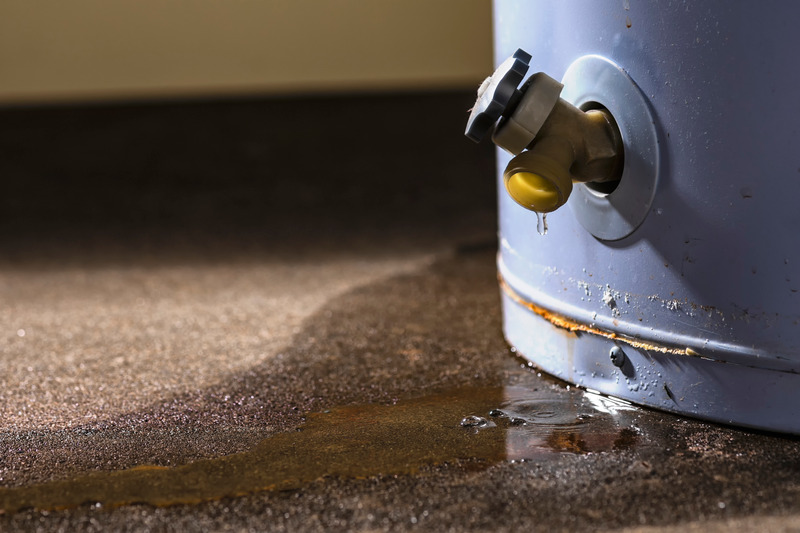A very common yet concerning issue that many homeowners face is a leaking water heater pressure relief valve. The pressure relief valve plays an important role in maintaining the safety and functionality of your water heater. A leak in the pressure relief valve can indicate multiple underlying problems that need prompt attention. Ignoring a leaking valve can lead to significant water damage, scalding risks, and even potential explosions. In this blog, we will cover the reasons why your water heater’s relief valve might be leaking, the dangers it poses, and how you can address and prevent this issue.
Like many other home appliances, you can go the route of tending to the problem yourself. However, it is important to decide whether or not seeking professional service is the safest and most effective option. The plumbers here at Logan Services work hard to tend to your plumbing needs.
Understanding the Pressure Relief Valve
What is a pressure relief valve?
Before fully diving into the blog, it is necessary to understand what the pressure relief valve is and what it’s designed to do. The pressure relief valve, also known as the temperature and pressure relief (T&P) valve, is a safety feature installed on water heaters and boilers. The valve is designed to release water if the temperature or pressure inside the tank exceeds safe limits. This feature ultimately prevents potential damage or catastrophic failure.
Function and Importance of Pressure Relief Valves
As previously mentioned, the primary function of the T&P valve is to protect your water heater from excessive pressure and temperature. If and when the internal pressure or temperature rises above the preset limit, the valve opens to release water, ultimately reducing the pressure and temperature to safe levels. This safety feature is crucial in preventing the tank from bursting or exploding, which can cause severe property damage and even personal injury.
Common Causes of Pressure Relief Valve Leaks
- Sediment and Mineral Buildup – Minerals and sediment from the water supply can accumulate in the water heater tank and the pressure relief valve. The buildup can obstruct the valve, which prevents it from sealing properly, leading to a leak. Regular maintenance, like flushing the tank, can minimize the buildup and prolong the life of your water heater and its components.
- Excessive Pressure – The pressure inside the tank increases due to thermal expansion. This is where the water is heated and expands. This increased pressure can cause the relief valve to open and release water.
- High Water Temperature – If the thermostat on your water heater is set too high, then the water can overheat, leading to increased pressure and causing the relief valve to leak.
- Valve Failure – Over time, mechanical wear can cause the relief valve to fail. Components such as the spring or seal may degrade, resulting in leaks from the valve.
- Wrong Valve Installation – The wrong valve can be installed. Using the incorrect type of valve for your water heater can cause compatibility issues and lead to leaks.
Dangers of a Leaking Pressure Relief Valve
- Water Damage – Like any other leak, a leak from your relief valve can create water damage in your home. Water can seep into the floors, walls, and foundations, which can cause damage to your home.
- Scalding Risks – The water that leaks out of the relief valve is often hot, which can cause severe burns if it comes into contact with the skin.
- Explosive Hazards – If the relief valve fails to release pressure adequately, it can lead to pressure buildup inside the tank. In extreme cases, this pressure buildup can cause the tank to rupture or explode.
How to Address a Leaking Pressure Relief Valve
- Initial Steps – Right away, you want to turn off the power and the water supply. For electric water heaters, turn off the power at the breaker box. For gas water heaters, set the gas control valve to “off.” Then, turn off the cold water supply to prevent more water from entering the tank.
- Assessing the Leak – Identify the source of the leak and determine the severity.
- Tightening the Valve – For minor leaks, gently tightening the valve with a wrench might stop the leak. Be careful not to over tighten, which can cause damage.
- Clearing Sediment and Mineral Deposits – Attach a garden hose to the drain valve towards the bottom of the tank and direct the hose to an appropriate drainage area. Open the valve and allow the water to flow out until clear. Remove the relief valve and soak it in vinegar or a commercial descaling solution. Rinse thoroughly before reinstalling.
- Replacing the Valve – If your valve is old or worn out, replacing it is necessary. First, purchase a replacement valve (make sure the new valve matches your water heater’s specifications). Then, remove the old valve and install the new one. Be sure to test the installation by turning the water on and looking for a leak.
Preventive Measures to Avoid Leaks
- Regular Maintenance – Conduct annual inspections and perform routine maintenance. We offer both options here at Logan Services!
- Installing an Expansion Tank – An expansion tank absorbs excessive pressure that is caused by thermal expansion. The expansion tank reduces the strain on the pressure relief valve.
- Adjusting the Thermostat – Set the water heater thermostat to the recommended temperature range, 120-140°F.
- Testing the Valve Regularly – Periodically lift the test lever on the pressure relief valve to ensure it opens and closes properly.
When to Call a Professional
- Persistent Leaks – If the leak continues despite your efforts, then it is time to call a professional plumber to check on the leak and provide solutions.
- High Water Temperature and Pressure Issues – Problems with excessively high water temperatures or pressure require expert assistance to ensure safety and proper resolution.
- Signs of Severe Malfunction – If you are experiencing strange noises, unpleasant odors, and continuous leaks, then obtain professional assistance immediately.
Final Thoughts
Addressing a leaking pressure relief valve promptly is essential to prevent potential damage and ensure the safety of your home. Regular maintenance can help you catch issues early on, while also helping you to avoid costly repairs. If you encounter persistent problems, don’t hesitate to reach out to our team of expert plumbers.
FAQ
Is a leaking pressure relief valve dangerous?
Yes, a leaking pressure relief valve can lead to water damage, scalding risks, and even potential explosions due to pressure buildup.
How can I prevent pressure relief valve leaks in the future?
You can prevent pressure relief valve leaks by receiving regular maintenance, proper installation, and by adjusting the thermostat to a safe temperature.
Can I repair a leaking pressure relief valve myself, or do I need professional help?
You can handle simple fixes like tightening the valve or clearing sediment, but persistent and/or severe issues should be addressed by a professional.
Why is water coming out of my water heater pressure relief valve?
Some common causes of relief valve water leaks include sediment buildup, excessive pressure, high water temperature, and valve failure.





















